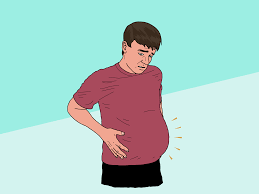Couvade Syndrome is the phenomenon in which a father experiences pregnancy symptoms when his partner is pregnant. The term “couvade” comes from the French word for “to hatch,” and was first observed by anthropologist Margaret Mead after studying pregnancy symptoms for men.
Couvade Syndrome may seem like a joke, but it’s no laughing matter. It can be very distressing for men to experience pregnancy symptoms while their partners are expecting. Quite strangely enough, the male partners begin to mirror their female partners in the expecting phase.
Here we will discuss what Couvade Syndrome is and its causes, how common this condition is, and other related information such as sympathectomy surgery and phantom pregnancies.
Contents
- 1 What Is Couvade Syndrome?
- 2 What Are Symptoms Of Couvade Syndrome?
- 3 What Causes Couvade Syndrome?
- 4 Can Couvade Syndrome Be Treated?
- 5 What Is The Treatment Strategy Of Couvade Syndrome?
- 6 Where To Get Help?
- 7 Psychotherapists On Couvade Syndrome
- 8 Couvade Syndrome vs. Sympathy Pregnancy
- 9 Couvade Syndrome v/s Phantom Pregnancy
- 10 Sympathy Pregnancy vs. Phantom Pregnancy
- 11 Conclusion
What Is Couvade Syndrome?
Couvade Syndrome is a term that describes the psychological and physical symptoms in men during pregnancy. It was first identified by anthropologist Margaret Mead, which led to it also being known as “sympathy” (or “empathy”) pregnancy or “pregnancy mimicry.”
How Common Is Couvade Syndrome?

There are limited studies that have been done on Couvade Syndrome. But it has been suggested that about one out of every 25 fathers experiences some form of pregnancy symptoms when their partners become pregnant.
So, Couvade Syndrome is not a common condition, but it is estimated that between 20% and 50% of fathers-to-be experience some symptoms. It can affect men of any age, social status, or ethnicity.
NOTE: On record, Couvade Syndrome qualifies as a rare condition, with fewer than 200 cases reported worldwide since it was first identified in the 1950s. However, as many men don’t seek help for these symptoms or may not even realize they have them, experts believe that this number could be significantly higher.
What Are Symptoms Of Couvade Syndrome?
The symptoms of Couvade Syndrome vary from person to person, but can include:
Physical Symptoms

- Morning sickness
- Weight gain
- Fatigue
- Swelling of the ankles and feet
- Changes in sex drive
- Indigestion or heartburn
Psychological Symptoms
- Anxiety or worry about the baby’s health and wellbeing
- Feeling overwhelmed by the experience of being a father and impending parenthood
- Sense of isolation or exclusion from the pregnancy experience
- Depression
Behavioral Symptoms
- Impaired concentration
- Insomnia or disturbed sleep
- Appetite changes
- Increased smoking and drinking
- Cravings for specific foods
- Anxiety in social situations where the woman is present
What Causes Couvade Syndrome?
The cause of Couvade Syndrome is still unknown, but there are several theories about what may contribute to it. These include:
Psychological factors
Some experts believe that the symptoms of Couvade Syndrome may be caused by a man’s anxiety or insecurity about becoming a father. They may feel that they are losing their masculinity or that they are no longer the primary focus of their partner’s attention. They may also feel powerless and overwhelmed by the experience of impending fatherhood.
Biological factors
Others believe that Couvade Syndrome may be caused by changes in a man’s hormone levels during pregnancy. This could include an increase in certain hormones, such as prolactin, or a decrease in testosterone.
Social factors
It is also possible that the symptoms of Couvade Syndrome may be related to a man’s social role and how he perceives his relationship to the pregnancy. For example, if he feels excluded from the experience or feels like he is taking on a traditional female role, he may experience the symptoms of Couvade Syndrome.
Can Couvade Syndrome Be Treated?

Yes, Couvade Syndrome can be treated. There are several different treatment options available, depending on the severity of the symptoms and the individual’s preferences.
Some men may choose to see a therapist who specializes in this condition. Others may prefer to take medication to help manage the symptoms.
Whatever treatment option you choose, it is important to seek help as soon as possible. The earlier Couvade Syndrome is diagnosed and treated, the easier it will be to manage.
What Is The Treatment Strategy Of Couvade Syndrome?
Health professionals will usually treat Couvade Syndrome using psychological interventions, such as Cognitive Behavioral Therapy (CBT), to address symptoms of anxiety and depression.
However, they will also look at other factors that could potentially contribute to these feelings before making a diagnosis. For example, they may consider:
Physical Factors
They may look at whether the man is taking any medication that could be causing symptoms of Couvade Syndrome. They will also carry out a physical examination to rule out other conditions that might cause similar symptoms, such as an overactive thyroid gland (hyperthyroidism).
Social Factors
The doctor may ask a man about how he feels his social role is affected by the pregnancy. They might also discuss any changes in their relationship and family life that could potentially be triggering symptoms of Couvade Syndrome, such as moving house or having to take on more domestic responsibilities.
Other Factors
In some cases, however, the cause of Couvade Syndrome is not clear. In these cases, the doctor may decide to carry out some additional tests to rule out other conditions. That could be responsible for causing physical or psychological symptoms of this condition. These include:
Physical Exam
Your doctor will perform a physical examination to check for anything unusual about you and how you behave. They may ask you questions, such as: Do your symptoms appear when your partner is pregnant but not at other times? Do you have any other symptoms that are not related to pregnancy?
Urine or Blood Test
These can help your doctor establish whether any biological factors could be causing you to experience these symptoms. These tests can also help your doctor determine whether there may be any other medical conditions that could be causing these symptoms.
Ultrasound Scans
Ultrasound scans use high-frequency sound waves to create an image of the inside of your body. This can help your doctor see whether there is anything unusual about the baby or the pregnancy that may be causing you to experience these symptoms.
MRI Scan
This test uses a magnetic field and radio waves to create images of the inside of your body. It can be used to help identify any physical problems that may be causing you to experience these symptoms.
Psychometric Tests
These can help your doctor assess whether there may be any psychological factors that are contributing to your symptoms.
Once your doctor has determined the cause of your Couvade Syndrome, they will be able to recommend the best treatment approach for you.
NOTE: If you are experiencing any symptoms related to couvade syndrome you must speak to or therapist. Not only can your doctor help you determine if this is the cause of your symptoms. But they may also be able to refer you to a therapist or other treatment options that could help.
Where To Get Help?
If you are experiencing any of the symptoms listed above, you must seek help from a professional. The earlier Couvade Syndrome is diagnosed and treated, the easier this condition will be to manage. You can ask your family doctor for a referral or search online to find a psychologist who specializes in Couvade Syndrome.
Psychotherapists On Couvade Syndrome
While there is not much known about Couvade Syndrome, psychologists and psychotherapists have noted that many men experience some symptoms of pregnancy during this time. The two most common types of Couvade Syndrome are phantom pregnancy and sympathy pregnancy.
Phantom pregnancy is when a man experiences many of the symptoms of pregnancy but does not have a child. This may include changes in eating habits, weight gain, and nausea.
Sympathy pregnancy is when a man experiences some physical or psychological symptoms of pregnancy because his partner is pregnant. This may include experiencing morning sickness, mood changes, or weight gain.
Couvade Syndrome vs. Sympathy Pregnancy
While Couvade Syndrome and sympathy pregnancy are similar in that they both involve a man experiencing some symptoms of pregnancy, there is a big difference between the two conditions.
With Couvade Syndrome, the man experiences physical and psychological symptoms of his own that can be quite severe. With sympathy for pregnancy, the man experiences none of these symptoms and may simply feel a sense of connection to his partner’s pregnancy.
It is important to note that not all men who experience Couvade Syndrome will have sympathy for pregnancy. And not all men who experience sympathy pregnancy will have Couvade Syndrome. The two conditions are quite different and should not be confused with one another.
Couvade Syndrome v/s Phantom Pregnancy
Phantom pregnancy and Couvade Syndrome are two different conditions that can occur in men during their partner’s pregnancy.
Phantom pregnancy is when a man experiences many of the symptoms of pregnancy but does not have a child. This may include changes in eating habits, weight gain, and nausea.
Couvade Syndrome is when a man experiences some physical or psychological symptoms of pregnancy because his partner is pregnant. This may include experiencing morning sickness, mood changes, or weight gain.
Sympathy Pregnancy vs. Phantom Pregnancy
There is a big difference between Couvade Syndrome and sympathy pregnancy, also known as phantom pregnancy. With sympathy for pregnancy, the man does not experience any of the physical or psychological symptoms of Couvade Syndrome. He may simply feel a sense of connection to his partner’s pregnancy.
Symptoms of phantom pregnancy
- Feeling as though you have a full-term belly after about 12 weeks of pregnancy (even if the doctor has said it’s too early to feel anything)
- Having strong cravings or aversions for certain foods that aren’t accompanied by morning sickness or heartburn
- Feeling as though you can feel your baby moving inside of you, even if the doctor says this is too early to feel anything other than gas bubbles.
- Feeling tired and exhausted for no apparent reason throughout pregnancy (and not getting a good night’s sleep because “the baby” keeps you up all night)
- Sudden mood swings, such as feeling weepy and emotional for no reason
- Having a strong desire to be around other pregnant women or mothers with babies
- Feeling like you’re “in denial” about your pregnancy and that people are constantly asking you when you’re going to have the baby. This can lead to feelings of isolation and loneliness.
NOTE: Some women will experience phantom pregnancy symptoms during Couvade Syndrome, such as nausea and increased appetite.
Conclusion
If you are a man who is experiencing symptoms of Couvade Syndrome, it is important to seek help from a health care professional. The earlier this condition is diagnosed and treated, the easier it will be to manage.
There are many treatment options available for Couvade Syndrome, so don’t hesitate to speak with your doctor or therapist. Remember, the sooner Couvade Syndrome is diagnosed and treated, the better chance you have of getting back to your normal life.
For more information, please contact MantraCare. Relationships are an essential part of human life. It is the connection between people, and it helps us to form social bonds, understand and empathize with others. If you have any queries regarding Online Relationship Counseling experienced therapists at MantraCare can help: Book a trial therapy session


